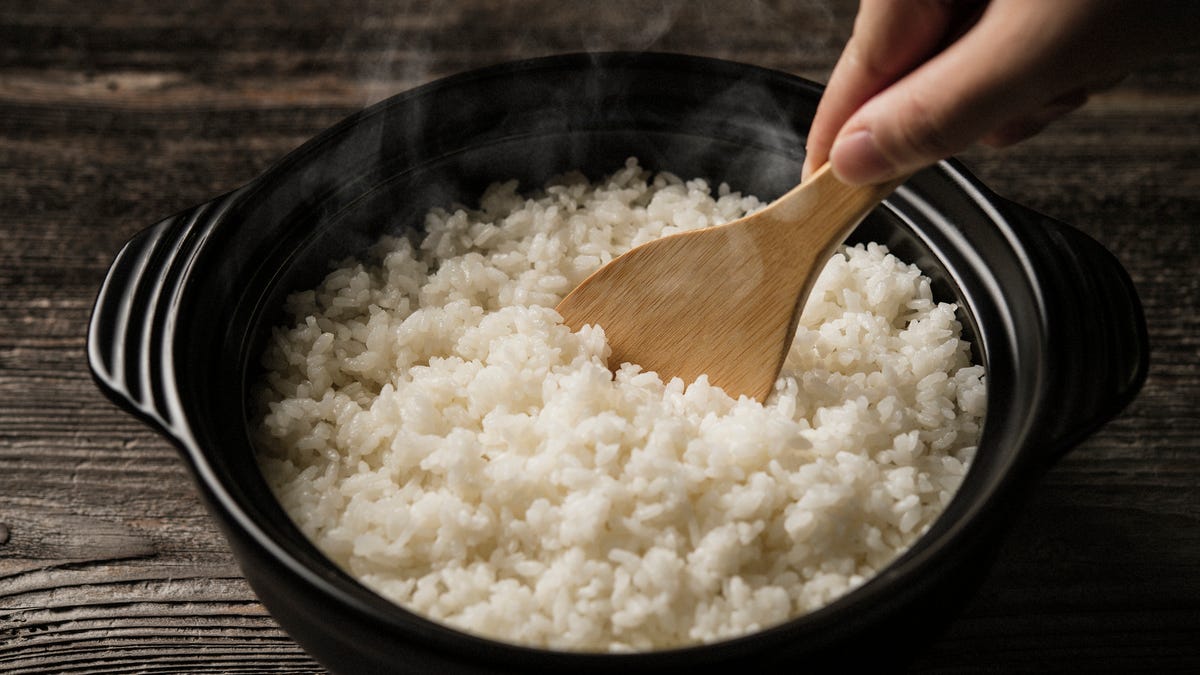 Why You Can Trust CNET
Why You Can Trust CNET Don't Feel Good After Eating That Leftover Rice? Here's Why
Think twice before you tear into that leftover takeout.

Bacteria called Bacillus cereus begins to quickly reproduce when rice sits at room temperature.
If you're often pressed for time, meal prepping can be a real game-changer. Planning your meals in advance can save you some serious cash, too. But if you often include foods like rice in your meal prep, you may be at risk of food poisoning.
It may be tempting when you're too busy to cook, but eating that leftover rice that's been sitting in the fridge a few days may be more trouble than it's worth. There's a small (but very real) chance that it could give you food poisoning (sometimes known as "fried rice syndrome"). The best thing to do? Toss it before you're tempted – or you might find yourself facing some unpleasant side effects.
Here's why you may want to avoid preparing a large serving of rice for the week ahead, and how you can properly store and prepare rice to prevent possible food poisoning.
For more health tips, here are eight tips to quit drinking alcohol that actually work and why you should add more carbs to your diet. And here's our advice for buying the best rice cookers.
Why does leftover rice have a risk of food poisoning?
All varieties of uncooked rice can contain spores of Bacillus cereus, a bacterium that can cause gastrointestinal illness like vomiting or diarrhea. The spores are heat-resistant and don't die when cooked. As the rice cools and enters the food danger zone of between 40 and 140 degrees Fahrenheit, the bacteria begins to quickly reproduce. There are about 63,400 cases of food poisoning from Bacillus cereus every year in the US, according to the Cleveland Clinic.
The big risk for food poisoning arises when rice is sitting out for more than an hour -- that's when the spores of bacteria can multiply greatly. The bacteria isn't a problem if you eat the rice right away. Illness is much more common from eating rice that has sat out at room temperature for a few hours, gets refrigerated and is then eaten a few days later. If your rice sits out for two hours at room temperature or one hour at 90 degrees Fahrenheit, it should be thrown away, according to Food Network.
What's the best way to store rice to avoid food poisoning?
To prevent food poisoning, you should put your leftover rice in the refrigerator soon after you're done cooking it -- the UK's National Health Service recommends storing it "ideally within one hour" -- and limit the amount of time your leftover rice is in the refrigerator.
However, you want to be careful to not put a hot container of food in the refrigerator, because that can increase the temperature of other foods and possibly lead to bacterial growth there as well. Food Network recommends portioning the large batch of rice into smaller containers and cooling the rice to room temperature (around 70 degrees).
The NHS recommends keeping your rice in the fridge for no more than one day until reheating, while the US Department of Agriculture's FoodKeeper app says you can store cooked rice for four to six days. Food Network says you can continue reheating the rice throughout the three to four days that it has been stored, while the NHS recommends not reheating more than once.
What is the safest way to reheat leftover rice?
If you are planning on reheating your rice, ensure that the rice comes out of the microwave or off the stove top steaming hot with an internal temperature of 165 Fahrenheit or higher. And the next time you're craving rice, limit the amount you make to what you and your dinner companions plan on eating that day. This also helps to prevent food waste, alongside the benefits of avoiding food poisoning.

